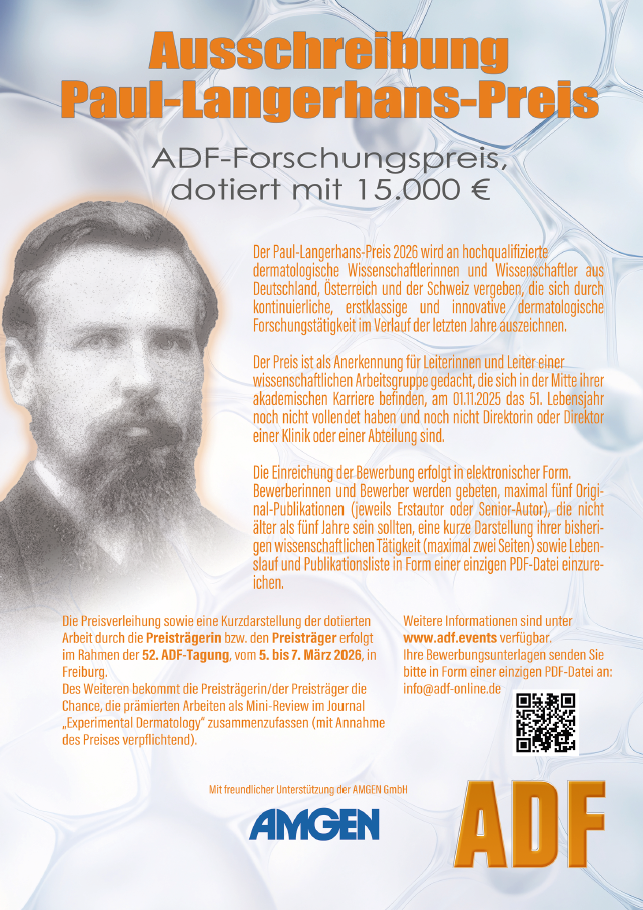ADF Awards
The ADF announces various prizes to reward scientists / researchers from the field of dermatological research. In addition to the Paul Langerhans Award for established researchers and the Egon Macher Award for young investigators outstanding works in the field of allergy research (ADF / ECARF Award of European Allergy Research) and oncology (Dermato Oncology Junior Scientist Award) will be honored on the ADF Annual Meetings.
In addition, the best posters will be awarded with a poster prize.
For the complete tender texts and the detailed allocation policies please click on the highlighted link.
Please note:
For poster prices, the ADF / ECARF Award for European Allergy Research, the Dermato Oncology Junior Scientist Awards and for the Translational Research Award, a separate application is not necessary. For these prices all abstracts submitted before the deadline will be evaluated.
Submissions for the Paul Langerhans Award and the Egon Macher Award should be made in all cases exclusively in electronic form as one PDF file to the ADF office.
Submission closed
Paul Langerhans Award of the ADF
- Research award, donated Amgen GmbH -
- To support scientific research in dermatology, the ADF announces since 2003 a yearly research award. This award is given to highly qualified dermatological scientists in Germany, Austria or Switzerland who are in the middle of their academic career and who distinguished themselves with continuous, excellent and innovative research over the past years.
- This ADF research award is endowed with EUR 15.000, - and can be shared by two researchers. If the scientific board of this award does not nominate a candidate, the provided amount will be saved to increase the award in one of the following years.
- Members of the ADF aged 50 or below who have not been an ADF awardee before can apply for the Paul Langerhans Award. Applicants should lead their own scientific group, but should not be director of a department. Only the applicant but not his/her co-authors must be members of the ADF.
- Only publications with the applicant being first or senior author, but not co-author can be taken into account for the Paul Langerhans Research Award. The submitted publications (maximum of 5) should not be older than 5 years. If the papers are in press a letter of acceptance needs to be provided.
- The majority of the scientific work should have been conducted at a dermatological research institution in Germany, Austria or Switzerland.
- A PDF of the publication needs to be sent electronically to the ADF office until Nov. 1st of the previous year. In addition a short description of the scientific career and a short CV with a publication record should also be provided electronically (as pdf-file). The submission must be combined into a single pdf-file.
- The ADF office checks the submission for formal correctness and for accordance to the statutes. It rejects incorrect applications and transmits formally suitable applications to the scientific board of trustees.
- The scientific board of trustees suggests one candidate awardee to the executive board of the ADF. Assessment criteria are: overall scientific merit of the applicant; relevance, novelty, originality and complexity of the achieved scientific results; scientific quality of the publications (journal impact factors, number of citations of the publications)
- Those members of the scientific board of trustees who are co-authors of submitted work or belong to the same department or institute as the applicants do not vote for the respective publications.
- The awardee is chosen by an independent board of trustees, which is elected by the executive board of the ADF each five years. The final decision is made by the executive board of the ADF which usually follows the suggestion of the board of trustees unless severe doubts are brought forward and discussed.
- The award is presented during the Annual ADF Meeting.
- The awardee is asked to publish a mini review at the ADF home journal Experimental Dermatology (mandatory with acceptance of the award).
Scientific board of trustees:- Prof. Dr. Alexander Navarini (Chair)
- Prof. Dr. Amir Yazdi
- Prof. Dr. Carola Berking
- Prof. Dr. Cyrill Géraud
- Prof. Dr. Wolfram Hoetzenecker
- Prof. Dr. Birgit Schittek
- Prof. Dr. Stefan Weidinger
- Prof. Dr. Peter Wolf

Past awardees of the Paul Langerhans Award of the ADF
Georg Stary, Vienna
Christoph Schlapbach, Bern
Patrizia Stoitzner, Innsbruck
Patrick Brunner, Vienna/New York
Diana Dudziak, Erlangen
Cyril Géraud, Mannheim
Claudia Günther, Dresden
Christina Zielinski, München
Stefanie Eyerich, Munich
Michael Hölzel, Bonn
Enno Schmidt, Lübeck
Thomas Wiesner, Vienna
Stephan Weidinger, Kiel
Kilian Eyerich, München
Kamran Ghoreschi, Tübingen
Christian Hafner, Regensburg
Kerstin Steinbrink, Mainz
Mark Berneburg, Tübingen
Ingo Haase, Köln
Stefan Martin, Freiburg
Ralf Paus, Lübeck
Dieter Maurer, Wien
Michael Schön, Würzburg Alexander Steinkasserer, Erlangen
Helmut Jonuleit, Mainz Stephan Beissert, Münster
Jürgen C. Becker, Würzburg Martin Steinhoff, Münster

